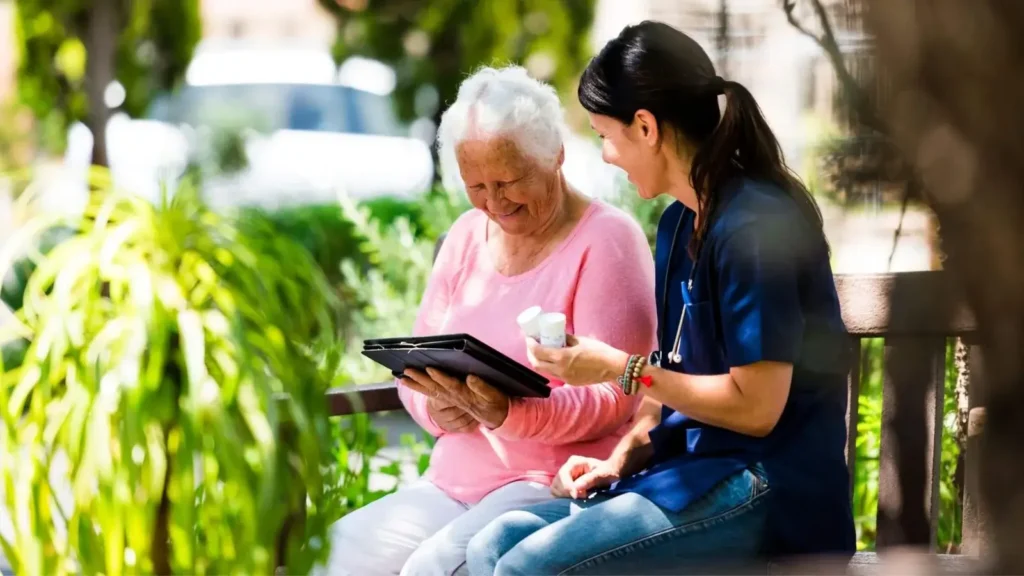These aren’t optional, they’re the foundation of good caregiving. With the right skills, you can provide better care, reduce your own stress, and handle daily challenges without feeling overwhelmed.
In this article, you’ll find 5 in-demand skills every caregiver should have in 2025.
You can also think of it as your personal checklist to grow, succeed in your career and care for elders with more confidence.
5 Skills Every Caregiver Should Have:
Here are 5 essential skills you need to thrive in your career. These skills will also help you connect and make a meaningful impact in the life of the person you’re caring for.
1. Communication:
Caregiving is a two-way street: the better you communicate, the better care you can provide.
Older adults often struggle to express what they need or how they feel. That’s why strong communication skills are essential. As a caregiver, you need to listen actively, observe non-verbal cues like body language or changes in mood, and understand what they might be struggling to say, so you can meet their needs with care and clarity.
Good communication also goes beyond one-on-one interaction. You need to speak clearly with doctors, share important updates with family members, and handle conversations during emergencies or sensitive moments with calm and confidence.
Read More: Key Communication Strategies for PSWs & Nurses in Senior Care
2. Compassion and Empathy:
In the healthcare profession, compassion means much more than just a basic human trait. It’s a skill that can improve both health outcomes and quality of life. Many older adults often feel isolated and alone. But when a caregiver takes the time to truly listen, respect their preferences, and prioritize their needs, it creates a sense of trust and comfort. Compassionate care surrounds them with positivity, which even helps in reducing anxiety and fear in many seniors.
Research supports this as well. A 2022 study found that when healthcare professionals show empathy, treat patients with respect, and build a strong personal connection, it improves how well the patient responds to treatment.

3. Problem Solving and Decision Making:
Unpredictable moments are part of caregiving, especially when you’re looking after an older adult. In those moments, you need to think on your feet. That means being able to quickly assess what’s happening, consider your options, and take the best course of action, even when no one else is around to guide you.
Whether it’s handling a sudden mobility issue, adjusting to a change in routine, or responding to a minor emergency, your ability to make calm, right decisions can can directly affect the senior’s comfort and safety.
If you struggle with this aspect of caregiving, you can build awareness by connecting with others in your field or joining support groups. It’s a great way to learn how others have handled similar problems and to find real-world solutions from people who have been in your shoes.
Read More: 4 Places to Find Caregiver Support Network
4. Organization and Time Management:
In caregiving, there’s always multiple things to handle at a time. Medication schedules, doctor’s appointments and daily routine tasks. Without proper organization, things can easily slip through the cracks. That’s why strong time management skills are important to keep your day smooth and stress-free. it also keeps you one step ahead and make sure you are not missing out any important aspects.
Read More: 12 Time Management Hacks for Caregivers
5. Adaptability:
As a caregiver, you need to adjust quickly when routines change or new needs arise. Being adaptable helps you stay calm in stressful situations, manage evolving care plans, and avoid burnout.
It also improves how you communicate with families and healthcare providers, ensuring everyone stays on the same page. The more flexible you are, the more confidently and compassionately you can support the person in your care.
How can You Improve Your Caregiving Skills?
You can build your caregiver skill set through hands-on experience, but online training and recognized courses also play an important role in building a strong foundation. There are many programs available with different lengths and fees, so you can choose one that fits your schedule and career goals.
A good place to start is a basic caregiver certification. It teaches essential skills like assisting with daily tasks, handling emergencies, and communicating effectively with families. If you want to advance your career, consider becoming a Certified Nursing Assistant (CNA) or a Home Health Aide (HHA). These programs help you gain deeper medical knowledge and prepare you for work in professional care settings.
We Help Your Loved One Age in Place:
At ConsidraCare, we believe every senior deserves to age with dignity. That’s why we focus on selecting individuals who can truly make that happen. Our team includes experienced nurses and professional support workers, trained to handle both daily care and complex medical conditions like Alzheimer’s.
We take the time to carefully match each caregiver with your loved one’s personality, interests, and needs — so you can feel confident knowing they’re in good hands.
Aging in place shouldn’t be complicated or costly. We’re making it affordable and simple for families across the GTA. Contact us today to find the right caregiver for your loved one — right at home.

Final Thoughts:
As the needs of older adults change, so will your approach. That’s when these particular skills become especially important. If you’re new to caregiving, it will take time, practice, and support to practice them effectively in your daily routine. But your focus should always stay on building these strengths. By doing so, you’ll be able to provide better care and take care of your well-being as well.
FAQ’s
1. What are the top 3 strengths of a caregiver?
The three most important strengths of a good caregiver are empathy, patience, and flexibility. Empathy helps you truly understand what the other person is going through. Patience keeps you calm even when things are difficult or repetitive. Flexibility allows you to adjust to new routines or sudden changes in health or mood.
2. What is the hardest responsibility of a caregiver?
One of the hardest parts is managing your time. You’re trying to meet someone else’s needs often around the clock—while also balancing your own life. It can feel like there’s never enough time in the day, and that can be exhausting. Staying organized and asking for help can make this part a little easier.
3. Why should a caregiver keep a diary?
Writing things down in a diary helps you process your thoughts and feelings. It also helps you notice small wins or happy moments you might otherwise forget. Even just a few minutes a day can lower stress, give you clarity, and make you feel more in control of your caregiving journey.
4. What are 2 things caregiver burnout may lead to?
Caregiver burnout can cause anxiety and anger. You might feel constant fear of making a mistake that could harm the person you’re caring for. In some cases—especially with dementia care—burnout can lead to frustration or anger, especially if the person resists help or doesn’t show appreciation. Burnout occurs when caregivers ignore self care for long stretch of time.




